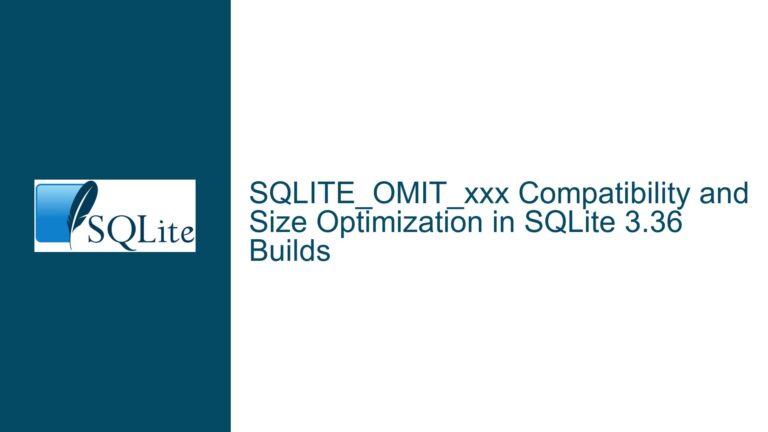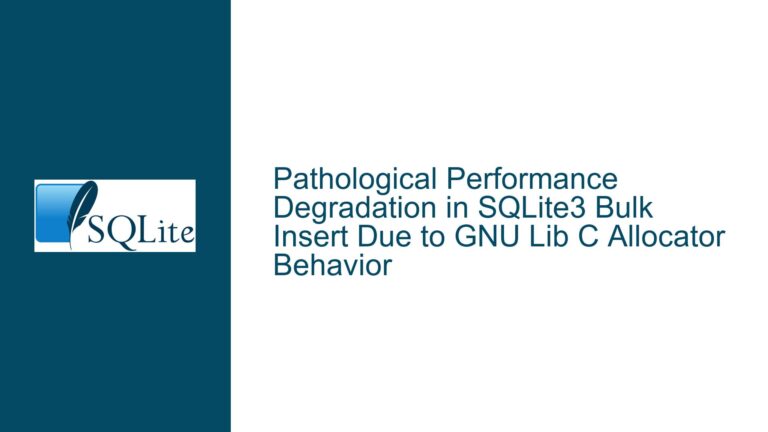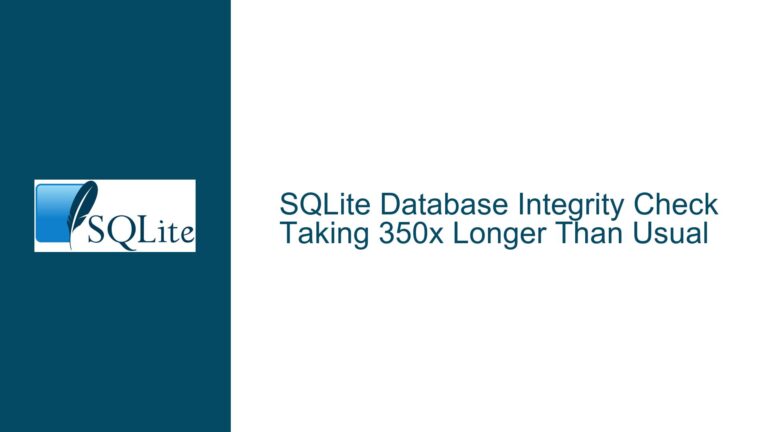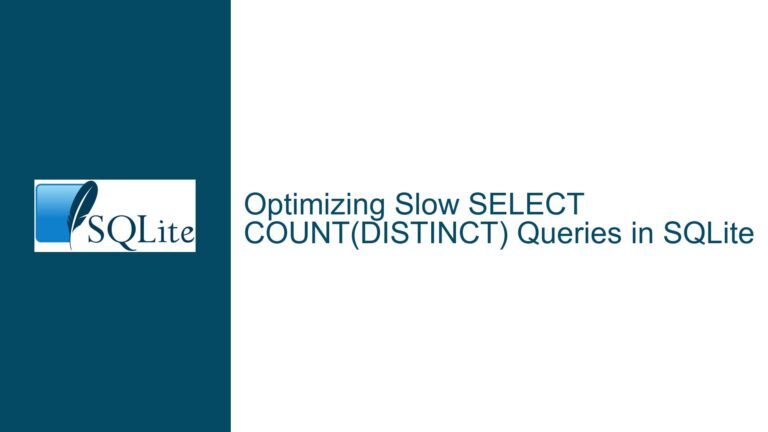Slow SQLite Query Performance When Retrieving TEXT Fields: Diagnosis and Solutions
Understanding Delayed TEXT Field Retrieval in Indexed Queries
Issue Context: Query Latency with TEXT Columns
The core problem revolves around a significant performance degradation in SQLite when executing queries that include TEXT (or VARCHAR) fields, despite the presence of appropriate indexes. The original scenario describes a query fetching 10,000 records from an indexed table, where omitting TEXT fields results in sub-100ms execution times, while including them increases latency to several seconds. This discrepancy persists even after configuring cache settings (PRAGMA cache_size) and confirming index usage via EXPLAIN. The issue was replicated across environments, ruling out localized configuration errors, and was ultimately traced to external factors such as I/O latency and output handling inefficiencies.
Key observations include:
- Queries selecting only integer/numeric columns (e.g.,
grid_x,grid_y,cycle,task) execute in 42ms. - Adding a small TEXT field (
src0, ~10 characters) increases latency to 844ms. - Including a large TEXT field (
source, ~200 characters) escalates latency to 2.5 seconds. - Selecting all columns (
SELECT *) results in 4.5 seconds of execution time.
The problem manifests most severely in cloud environments (e.g., AWS EC2 with EBS storage) but resolves when the database is loaded into memory or output is suppressed, implicating I/O and data serialization as critical factors.
Root Causes of TEXT Field Retrieval Latency
Three primary factors contribute to the observed performance degradation:
Row Decoding Overhead and Page Access Patterns
SQLite stores database content in fixed-size pages (default: 4KB). Each row (record) is stored as a contiguous byte sequence within these pages. When a query selects a subset of columns, SQLite must decode the entire row to extract the requested fields. TEXT fields, especially variable-length types likeVARCHAR, introduce decoding complexity:- Variable-Length Storage: TEXT fields are stored as variable-length records. Their actual size determines whether they fit within the row’s primary storage page or spill into overflow pages. Accessing overflow pages requires additional I/O operations.
- Column Ordering: The physical order of columns in the table schema impacts decoding speed. Fixed-length columns (e.g.,
INT) are stored first, followed by variable-length fields. If variable-length fields are interspersed with fixed-length ones, SQLite must parse past them to reach subsequent columns, increasing CPU overhead.
In the provided schema:
CREATE TABLE instruction_trace ( grid_x INT NOT NULL, grid_y INT NOT NULL, cycle INT NOT NULL, op_addr VARCHAR(50), -- Variable-length op_name VARCHAR(50), -- ... dest VARCHAR(50), src0 VARCHAR(50), src1 VARCHAR(50), src2 VARCHAR(50), source VARCHAR(300), -- Largest variable-length field source_line VARCHAR(50), task INT );The interspersed variable-length columns force SQLite to decode through multiple TEXT fields to reach later columns like
task. This design exacerbates decoding latency when selecting columns aftersrc2.Index Coverage and Table Lookup Penalty
While the query uses an index (idx_instr_x_y) to locate rows matchinggrid_x = 1 AND grid_y = 1, the index does not cover all selected columns. As a result, SQLite performs an index-to-table lookup to retrieve non-indexed columns (e.g.,src0,source). Each lookup involves:- Fetching the row’s primary key (rowid) from the index.
- Accessing the corresponding row in the main table (heap).
- Decoding the row to extract the requested columns.
This process becomes costly when:
- The main table’s rows are large (due to TEXT fields), requiring access to multiple pages per row.
- The working set exceeds the available cache, forcing frequent disk I/O.
I/O and Output Serialization Bottlenecks
In cloud environments, even high-IOPS storage (e.g., AWS EBS io2) introduces latency due to network-attached storage overhead. Retrieving TEXT fields amplifies this issue:- Overflow Page Access: Large TEXT fields (e.g.,
source VARCHAR(300)) may exceed the row’s inline storage capacity, forcing SQLite to read additional overflow pages. - Result Serialization: The SQLite CLI spends significant time formatting and transmitting large TEXT results to the console. Redirecting output to
/dev/null(or equivalent) eliminates this penalty, as demonstrated in the discussion.
- Overflow Page Access: Large TEXT fields (e.g.,
Optimizing TEXT Field Retrieval: Strategies and Fixes
1. Schema Restructuring for Efficient Row Decoding
Reorder columns to prioritize fixed-length and frequently accessed fields, placing variable-length (TEXT) fields at the end:
CREATE TABLE instruction_trace (
grid_x INT NOT NULL,
grid_y INT NOT NULL,
cycle INT NOT NULL,
task INT, -- Moved before TEXT fields
op_addr VARCHAR(50),
op_name VARCHAR(50),
dest VARCHAR(50),
src0 VARCHAR(50),
src1 VARCHAR(50),
src2 VARCHAR(50),
source_line VARCHAR(50),
source VARCHAR(300)
);
- Benefit: SQLite decodes fixed-length columns (
grid_x,grid_y,cycle,task) first, allowing it to skip variable-length fields when they are not selected. This reduces per-row decoding time.
2. Leverage Covering Indexes
Create indexes that include all columns required by the query, eliminating table lookups:
CREATE INDEX idx_instr_x_y_covering ON instruction_trace (
grid_x, grid_y
) INCLUDE (
cycle, task, src0, source
);
- Benefit: Queries selecting
grid_x,grid_y,cycle,task, and any included TEXT fields will read directly from the index, bypassing the main table. This is particularly effective for frequently accessed subsets of columns.
3. Mitigate I/O Overhead
- Increase Page Size: Use a larger page size (e.g., 8KB or 16KB) to reduce overflow page usage:
PRAGMA page_size = 8192; -- Must be set before creating the database - Preload Data into Memory: Load the entire database into memory during initialization:
sqlite> .restore mem_db sqlite> PRAGMA mmap_size = 1073741824; -- 1GB memory-mapped I/O
4. Optimize Query Patterns
- Avoid
SELECT *: Explicitly list required columns to minimize decoded data. - Batch Retrieval with Pagination: Use
LIMITandOFFSETto process large result sets in chunks, reducing memory pressure.
5. Environment-Specific Tuning
- Disable Secure Delete: Prevent SQLite from zeroing deleted data, reducing write amplification:
PRAGMA secure_delete = OFF; - Use WAL Mode: Enable Write-Ahead Logging for concurrent read/write performance:
PRAGMA journal_mode = WAL;
6. Output Handling in CLI
Redirect output to a file or suppress it during benchmarking to isolate query execution time from serialization overhead:
sqlite3 db.sqlite ".once /dev/null" "SELECT * FROM instruction_trace ..."
By systematically addressing schema design, index coverage, I/O configuration, and output handling, developers can mitigate the performance penalties associated with TEXT field retrieval in SQLite. The strategies outlined here are particularly critical in cloud environments where storage latency and resource contention exacerbate inherent database inefficiencies.






